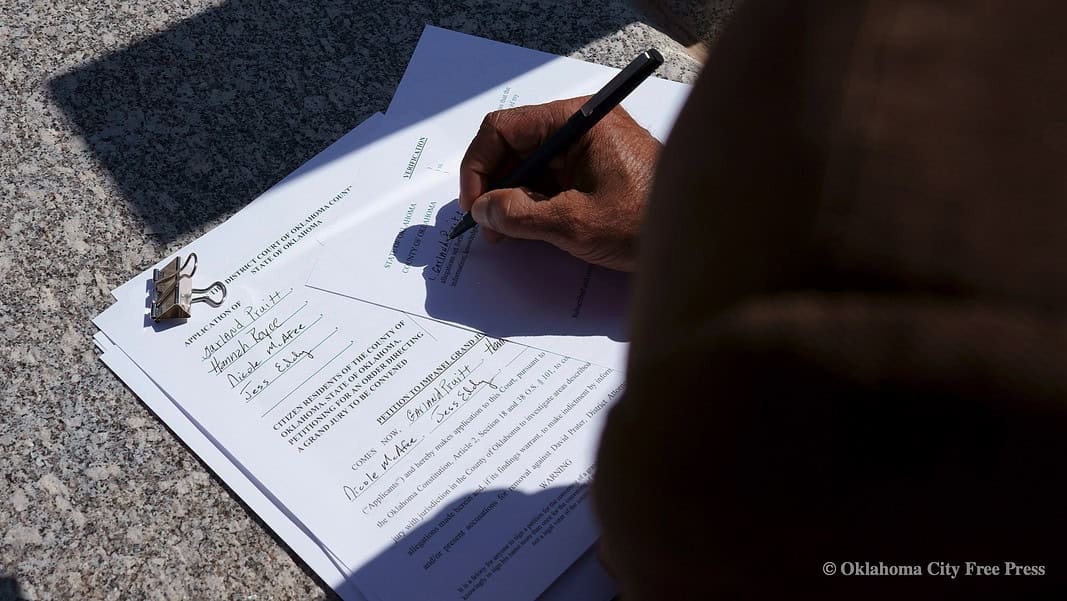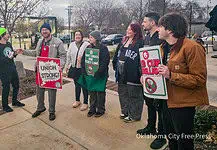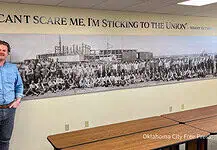OKLAHOMA CITY – Workers for the Raise the Wage campaign turned in their petition signatures to the Oklahoma Secretary of State Monday in another step toward getting the proposed State Question 832 on an upcoming ballot.
“Volunteers and supporters of the Raise the Wage campaign gathered this morning (July 15th) at the Secretary of State’s Office to turn in close to 180,000 signatures, nearly double the required number to ensure State Question 832 will qualify for the (November) ballot,” read a press release on the same day from the campaign.
With that many signatures supporters of the measure are confident that enough signatures will be certified to get the initiative on the ballot.
This comes after several groups rose to challenge the effort through the courts but failed to stop the petitioning effort.
However, a question still lingers as to whether a new law passed by the Legislature this year — HB 1105 — would affect SQ 832 since signatures were being gathered before the bill was passed and signed into law. It would allow a 90-day challenge period for signatures on an initiative petition instead of the 10 days currently allowed.
If the law is determined to be in effect for this petition, it is likely that the SQ 832 would not make it onto the November ballot. But, if the old law is in place, there is a good chance that it will.
What SQ 832 would do
If passed, SQ 832 would raise the minimum wage to $15 an hour by amending the Oklahoma Minimum Wage Act (OMWA). Employers and businesses would be required to raise wages progressively over several years:
- $9 an hour in 2025.
- $10.50 an hour in 2026.
- $12 an hour in 2027.
- $13.50 an hour in 2028.
- $15 an hour in 2029.
That’s not the end of the state question’s effects. Beginning in 2030, the minimum wage would be adjusted to increase with the cost of living using the Department of Labor’s Consumer Price Index for Urban Wage Earners and Clerical Workers data.
The state question would also eliminate certain exemptions that are allowed in OMWA right now. Those exemptions are:
- Employers subject to the federal Fair Labor Standards Act.
- Part-time employees.
- Certain students and individuals under the age of 18.
- Certain farm and agricultural workers.
- Domestic service workers.
- Newspaper vendors or carriers.
- Feedstore employees.
Some workers would not be covered under this measure. Federal and state employees wouldn’t be covered, and employers with fewer than 10 workers would not be covered.
Supporters are hopeful
Cindy Alexander, volunteer signature collector, and lead trainer, explained, “Volunteers have worked tirelessly over the last 90 days collecting signatures in every corner of the state.”
She continued, “Its been humbling to be part of a solution to a problem that is faced by so many hard-working Oklahomans, and that’s what I love most about the initiative petition process is knowing I played a vital role in changing a policy that politicians didn’t have the courage to tackle themselves.”
A spokesperson for Raise the Wage Oklahoma, Amber England also commented, “The cost of gas, groceries, and housing has all gone up, but wages have largely stayed the same. Voters across the state are excited to vote yes to help lift the wages of workers doing essential jobs like caring for the most vulnerable among us in nursing homes and hospitals, and those working in industries that care for Oklahoma’s young children in childcare.”
The press release concludes, “If passed, more than 320,000 would get a pay increase – ensuring they can afford basic costs of living like putting food on the table for their families, and paying their rent on time. Thousands of Oklahomans work full-time and earn less than $15.100 a year on minimum wage.”
Alex Gatley covers labor activities in the state of Oklahoma.











